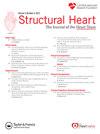A Review of “Access to Care” Issues in Aortic Stenosis Patients: A Negative Report Card
IF 1.4
Q3 CARDIAC & CARDIOVASCULAR SYSTEMS
引用次数: 0
Abstract
The identification and management of patients with aortic stenosis exist along a continuum that includes healthy living, latent progression, diagnosis, treatment, and posttreatment recovery. Barriers to the provision of appropriate care for these patients can occur at any stage along this continuum. Despite the presence of diagnostic echocardiograms, many patients with aortic stenosis are never clinically recognized, and the rate of mismanagement worsens among underrepresented minority groups and women. Regarding the treatment of clinically recognized aortic stenosis, only about half of patients with symptomatic severe aortic stenosis actually undergo aortic valve replacement within 2 years of diagnosis. Treatment rates are even lower among patients with symptomatic low-gradient severe aortic stenosis. Although several strategies have been raised by experts within the field to help and improve the diagnosis and treatment of patients with aortic valve disease, timely referral to a heart valve team specialist whenever aortic valve replacement is being considered likely remains the most pertinent intervention. Connecting these patients with fully informed aortic valve disease experts helps facilitate shared decision-making discussions, thus ensuring that patients have the opportunity to learn about and potentially receive the lifesaving interventions available to them.
主动脉瓣狭窄患者“获得护理”问题的回顾:一份负面报告卡
主动脉瓣狭窄患者的识别和治疗是一个连续的过程,包括健康生活、潜在进展、诊断、治疗和治疗后恢复。在这个连续体的任何阶段都可能出现为这些患者提供适当护理的障碍。尽管存在超声心动图诊断,但许多主动脉瓣狭窄患者从未被临床识别,并且在代表性不足的少数群体和女性中,管理不善的比率恶化。对于临床上公认的主动脉瓣狭窄的治疗,只有大约一半的有症状的严重主动脉瓣狭窄患者在诊断后2年内真正进行了主动脉瓣置换术。对于症状性低梯度严重主动脉狭窄的患者,治愈率甚至更低。尽管该领域的专家提出了几种策略来帮助和改善主动脉瓣疾病患者的诊断和治疗,但无论何时考虑主动脉瓣置换术,及时转诊到心脏瓣膜小组专家仍然是最相关的干预措施。将这些患者与知情的主动脉瓣疾病专家联系起来有助于促进共同决策讨论,从而确保患者有机会了解并可能接受他们可用的挽救生命的干预措施。
本文章由计算机程序翻译,如有差异,请以英文原文为准。
求助全文
约1分钟内获得全文
求助全文
来源期刊

Structural Heart
Medicine-Cardiology and Cardiovascular Medicine
CiteScore
1.60
自引率
0.00%
发文量
81
 求助内容:
求助内容: 应助结果提醒方式:
应助结果提醒方式:


